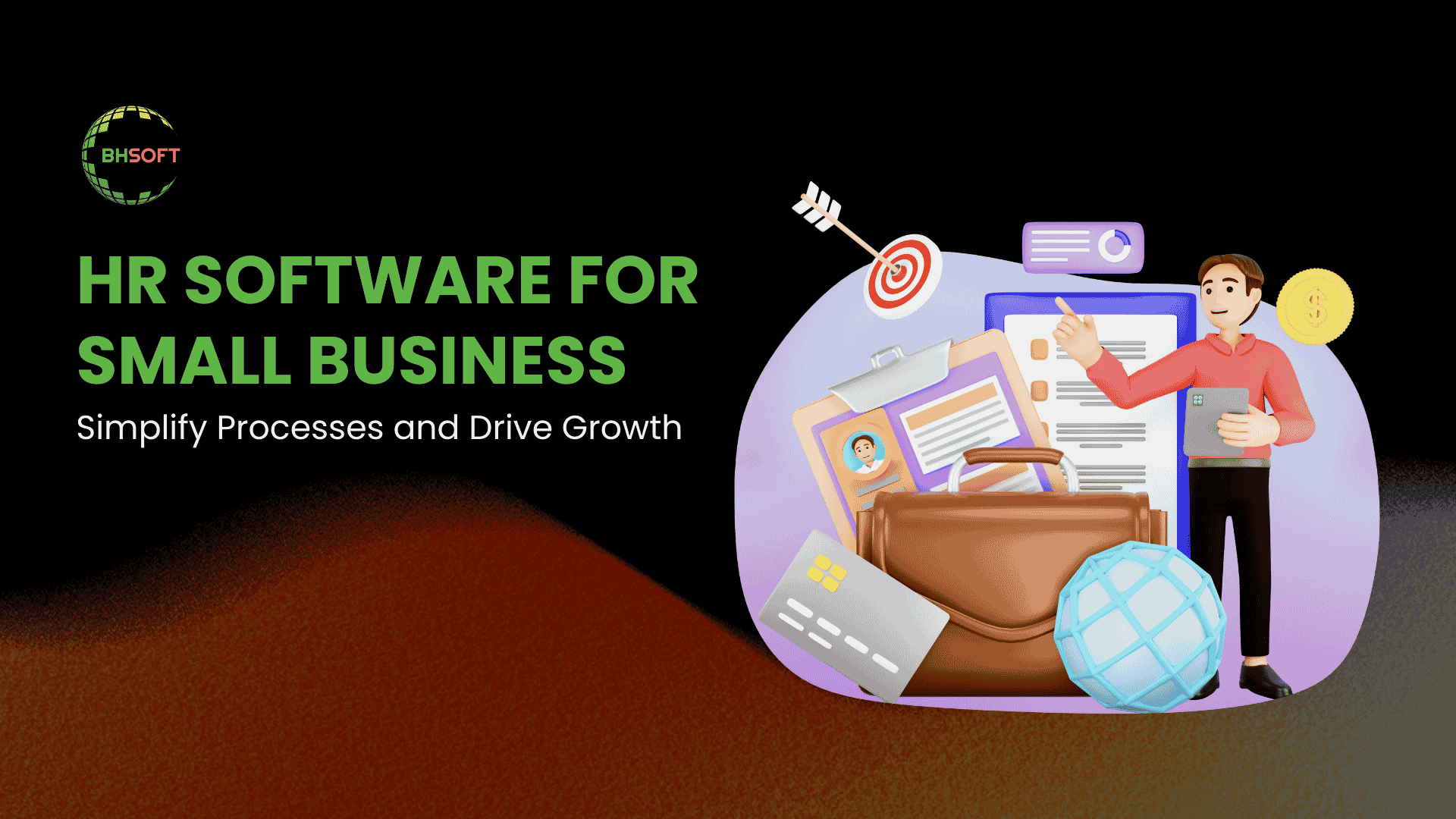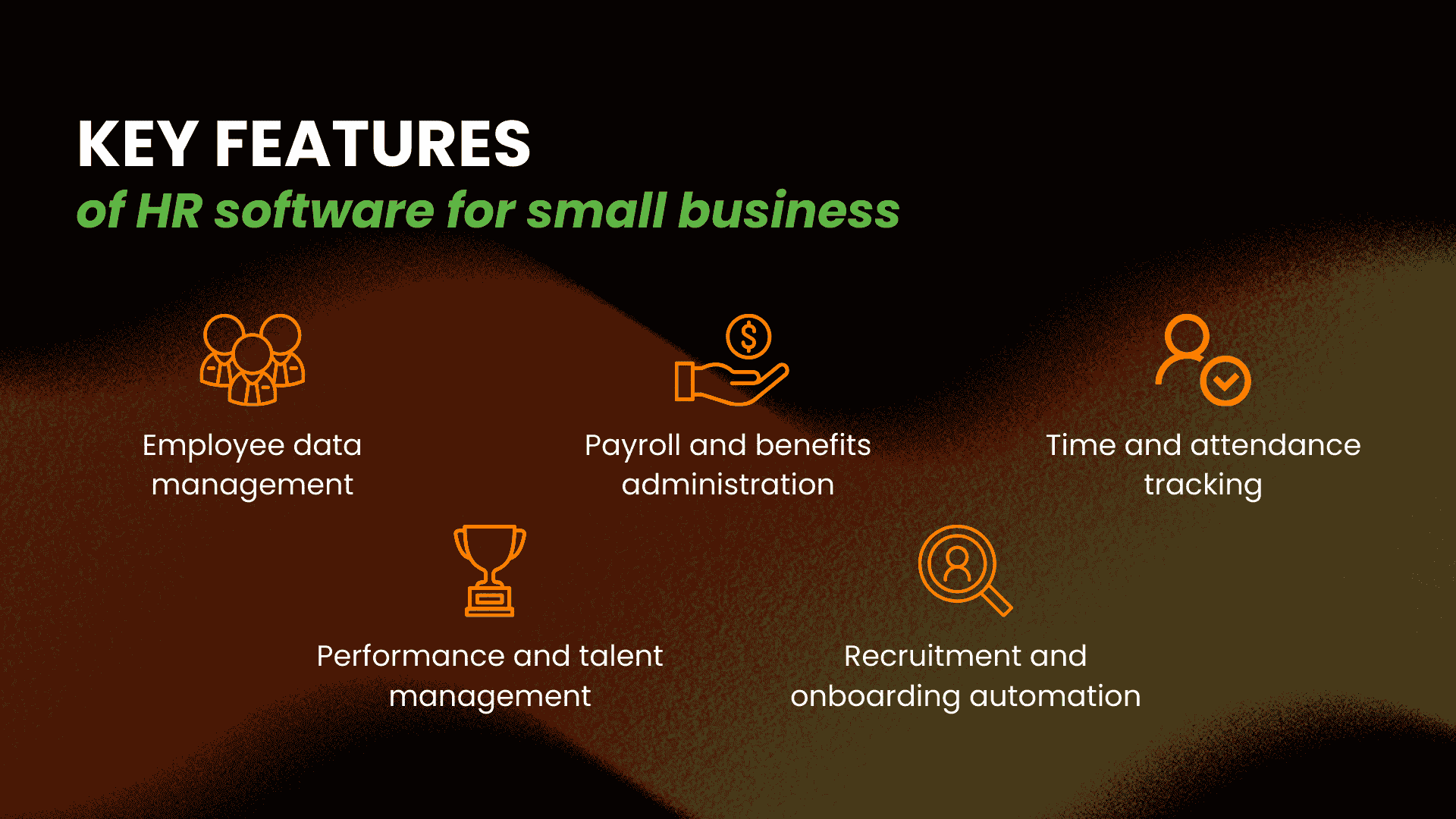Home > Insight > IT Business
How HR Software for Small Business Can Simplify Processes and Drive Growth
5 minutes read
Audio description available
February 5, 2025
Managing HR tasks manually can be overwhelming for small businesses, leading to inefficiencies, compliance risks, and wasted time. HR software for small business offers a smarter way to handle payroll, attendance, recruitment, and employee management. It helps business owners focus on growth rather than paperwork. But how does it simplify processes, and what features should you look for in the right solution? With today’s blog, you can explore how HR software can transform your business operations.

1. Why setting up HR software for small business is essential?
1.1. What is HR Software for small business?
HR software for small business is a digital solution that automates and manages human resources tasks such as payroll, recruitment, attendance tracking, and compliance management. It helps small businesses streamline operations, reduce errors, and improve workforce management.
Without an efficient HR system, small businesses often struggle with manual processes, compliance risks, and administrative overload. Setting up HR software for small business ensures accurate record-keeping, smooth payroll processing, and better employee engagement. It allows business owners to focus on growth rather than time-consuming HR tasks.
1.2. Common HR Challenges in Small Businesses
Many small businesses handle HR manually, leading to inefficiencies and mistakes. Here are the most common HR challenges they face:
a) Managing employee records manually leads to inefficiencies
Keeping paper-based employee records is outdated and risky. Files can be lost, damaged, or disorganized. Manual data entry takes time and increases errors. HR software for small business centralizes employee information, making it easy to access, update, and secure.
b) Payroll processing errors can result in compliance issues
 Payroll mistakes can lead to penalties, employee dissatisfaction, and legal problems. According to the IRS, 40% of small businesses incur payroll penalties due to errors. HR software for small business automates salary calculations, tax deductions, and compliance reporting, reducing costly mistakes.
Payroll mistakes can lead to penalties, employee dissatisfaction, and legal problems. According to the IRS, 40% of small businesses incur payroll penalties due to errors. HR software for small business automates salary calculations, tax deductions, and compliance reporting, reducing costly mistakes.
c) Onboarding and recruitment are time-consuming without automation
Hiring and onboarding require paperwork, scheduling, and communication. Doing this manually slows down the process and frustrates new hires. HR software for small business automates job postings, applicant tracking, and digital onboarding, improving efficiency and candidate experience.
d) Tracking attendance and leave requests can be disorganized
Manual attendance tracking leads to payroll discrepancies and disputes. Employees may forget to log hours or misuse leave policies. HR software for small business provides automated time tracking, real-time reporting, and self-service leave management for transparency.
Learn more: BHSoft Secures ISO/IEC 27001:2013 and ISO 9001:2015 Certifications
2. Key features of HR software for small business to solve the challenges
HR software for small business automates essential HR tasks, reducing errors and improving efficiency. It helps businesses manage employees, payroll, and hiring while ensuring compliance. Here are the key features that solve common HR challenges.

2.1. Employee data management
Secure storage and easy access to employee records
Manually storing employee records is risky and inefficient. Paper files get lost, and spreadsheets can be hard to manage. HR software for small business provides a secure, digital database for employee information. Businesses can access, update, and organize records easily from one platform.
2.2. Payroll and benefits administration
Automated payroll processing with tax compliance
Payroll errors can lead to legal penalties and unhappy employees. HR software for small business automates payroll calculations, tax deductions, and direct deposits. This ensures accuracy, reduces compliance risks, and saves time.
Benefits tracking and deductions management
Tracking employee benefits manually is complicated. Mistakes in health insurance or retirement contributions cause frustration. HR software for small business manages benefits efficiently, ensuring correct deductions and accurate reports.
2.3. Time and attendance tracking
Real-time attendance monitoring with automated leave requests
Small businesses often struggle with tracking attendance and leave requests. HR software for small business provides automated time tracking with real-time data. Employees can request leave digitally, and managers can approve it instantly. This eliminates paperwork and reduces payroll mistakes.
2.4. Performance and talent management
Employee evaluation tools and performance tracking
Without structured evaluations, employee growth is hard to measure. HR software for small business includes performance tracking tools, allowing businesses to assess productivity, set goals, and give feedback. Automated evaluations improve employee engagement and retention.
2.5. Recruitment and onboarding automation
Applicant tracking system (ATS) for efficient hiring
Hiring manually is time-consuming and disorganized. HR software for small business includes an ATS to streamline job postings, filter applications, and track candidates. This speeds up recruitment and improves hiring decisions.
Paperless onboarding with digital documentation
Onboarding new hires involves contracts, tax forms, and training materials. Handling these manually is slow and inefficient. HR software for small business automates onboarding with digital documents, e-signatures, and self-service portals, making the process seamless.
Read more: Fleet Management Software For Small Businesses: A Complete Guide
3. How HR software boosts business growth
Managing HR manually slows down operations and increases errors. HR software for small business growth and HR management software for small companies automate core processes, improve employee experience, and ensure compliance. These digital HR solutions help businesses operate efficiently while preparing for long-term, scalable growth.
3.1. Saves time and reduces administrative burden
HR automation frees up time for business owners to focus on growth
Small business owners spend hours handling payroll, attendance tracking, and recruitment. These manual HR tasks take time away from strategy and expansion. HR automation software for small businesses streamlines repetitive workflows, reduces administrative workload, and improves overall productivity.
Automation also minimizes paperwork and manual data entry. With cloud-based HR software for small businesses, companies can process payroll, approve leave requests, and manage employee records in just a few clicks. This operational efficiency allows business owners to focus on scaling their business.
3.2. Improves employee engagement and retention
Self-service portals empower employees
Employees often need quick access to payslips, leave balances, and benefits information. Without a centralized HR system, they must rely on HR staff for every request. HR software solutions for small businesses include employee self-service portals that allow staff to manage personal data independently.
This functionality reduces HR workload and empowers employees with greater control over their records. It also improves satisfaction by offering transparency and instant access to essential HR information through a digital HR platform for small companies.
Transparent HR processes improve satisfaction
Unclear HR policies can lead to confusion and frustration. HR software for small business management ensures transparency in leave approvals, performance evaluations, and payroll calculations. Employees can track progress, receive timely feedback, and clearly understand company policies.
According to Gallup, businesses with engaged employees see a 23% increase in profitability. Well-structured HR processes supported by modern HR software systems for small businesses lead to happier, more productive teams.
3.3. Enhances compliance and reduces risks
Automated compliance tracking helps avoid legal penalties
Small businesses must comply with labor laws, tax regulations, and internal workplace policies. Manual compliance tracking increases the risk of costly errors. HR compliance software for small businesses automates regulatory checks and sends alerts for important deadlines.
Features such as automated tax calculations, payroll compliance, and labor law updates ensure organizations remain compliant. This reduces legal risks and builds employee trust in secure HR management software.
3.4. Scales with business expansion
Cloud-based HR software grows with your business needs
As companies grow, managing a larger workforce becomes more complex. Scalable HR software for small and growing businesses adapts easily to expansion by supporting new employees, departments, and locations without operational disruption.
Cloud-based HR management systems allow businesses to access real-time data from anywhere. Whether onboarding new hires or expanding operations, companies can manage HR processes smoothly and efficiently using flexible HR software solutions.
4. Why a custom HR solution might be the best fit
Every small business has unique HR needs. Standard HR
software for small business management or cloud-based HR software for small
companies may not provide the flexibility required to handle specific
workflows, compliance requirements, or integrations. A custom HR solution
offers tailored features and custom HR software development for small
businesses, ensuring better efficiency and long-term scalability.

4.1. One-size-fits-all HR software vs. Tailored solutions
Most off-the-shelf HR software solutions for small businesses come with pre-defined features. While these platforms work for general HR tasks such as employee records and basic payroll processing, they may not align with industry-specific HR management needs or complex internal workflows.
A custom HR solution is built to match a business’s unique requirements. It adapts to existing workflows, supports HR automation software for small businesses, and eliminates unnecessary functions. This flexibility helps businesses manage HR operations more efficiently without forcing them to adjust to a rigid, one-size-fits-all HR system.
4.2. Seamless integration with payroll, accounting, and business tools
HR processes must work smoothly with other business functions. Many small businesses rely on HR and payroll software integration, accounting platforms, and workforce management tools. Without proper integration, HR teams must enter data manually, leading to errors and inefficiencies.
A custom HR solution ensures seamless data flow across different systems. Payroll, attendance tracking, employee benefits, and tax deductions update automatically through integrated HR management software, eliminating redundant work. This improves accuracy, reduces compliance risks, and saves time.
4.3. Industry-specific compliance and data security
Different industries follow different labor laws and tax regulations. Generic HR software for small business compliance may not fully cover industry-specific requirements, increasing the risk of penalties and legal issues.
A custom HR solution ensures businesses comply with local labor laws, payroll regulations, and tax policies. It automates compliance tracking, generates audit-ready reports, and sends alerts for regulatory changes. Strong data security features—such as role-based access control, data encryption, and secure cloud infrastructure—protect sensitive employee information stored in HR software systems for small companies.
According to IBM, 83% of small businesses lack proper security measures, making them vulnerable to data breaches. A tailored HR system strengthens security, preventing unauthorized access and data leaks.
4.4. Scalable HR technology that grows with your business
As small businesses expand, HR needs become more complex. A rigid HR management system for small businesses can slow down growth, forcing companies to migrate to a new platform sooner than expected.
A custom HR solution scales with business expansion.
Companies can add new features, integrate additional tools, and onboard more
employees using scalable HR software for growing businesses without system
limitations. This flexibility ensures long-term cost-effectiveness and avoids
frequent software replacements.
4.5. AI and automation-driven HR for maximum efficiency
Artificial Intelligence (AI) is transforming modern HR operations. Standard HR software for small business owners may lack advanced automation and AI-driven insights, limiting efficiency gains.
A custom HR solution leverages AI-powered HR automation tools for small businesses to automate recruitment, process payroll, track attendance, and generate performance analytics. Machine learning algorithms help businesses predict workforce trends, optimize hiring decisions, and improve employee engagement.
Off-the-shelf HR software for small business may work for basic needs, but it lacks customization, integration, and scalability. A custom HR system ensures businesses stay compliant, secure, and efficient while adapting to growth. Investing in a tailored HR solution provides long-term benefits, fewer limitations, and better automation—helping small businesses thrive in a competitive market.
Conclusion
A custom HR solution gives small businesses the flexibility, automation, and scalability needed to manage HR operations efficiently. Unlike standard HR software for small business, a tailored system integrates seamlessly with payroll, accounting, and compliance tools. It ensures businesses stay ahead by reducing administrative burdens, improving employee experience, and minimizing compliance risks.
With AI-powered automation, secure data management, and scalable features, a custom HR solution helps businesses grow without software limitations. It adapts to industry-specific needs, eliminating inefficiencies and providing long-term value. Investing in the right HR software is not just about simplifying tasks - it’s about creating a foundation for sustainable business success.
At BHSoft, we specialize in custom HR Management Software Solutions designed for small businesses. Whether you're looking to automate payroll, streamline recruitment, or improve workforce management, our solutions help you scale efficiently. Contact us today to explore how our HR software can transform your business and drive growth.


